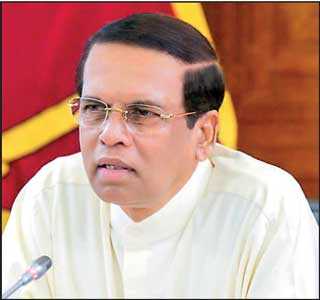Friday Feb 27, 2026
Friday Feb 27, 2026
Friday, 12 July 2019 00:00 - - {{hitsCtrl.values.hits}}
By Chandani Kirinde
The proposed amendments to the Monetary Law Act (MLA) are to be reviewed by a committee of economists, after President Maithripala Sirisena voiced concerns about the proposed changes.
 |
President
|
In a memorandum to the Cabinet, the President said that before the amendments to the MLA are submitted to the Legal Draftsperson, it must go through a broader stakeholder dialogue and consultation process. “I propose that the National Economic Council convene a committee of experts to study the provisions of the proposed MLA and submit a report to the Cabinet of Ministers for consideration,” the President said.
The main thrust of the amendments to the MLA is to strengthen the independence of the Central Bank of Sri Lanka (CBSL) while facilitating the adoption of a Flexible Inflation Targeting (FIT) mechanism.
The President observed that while the FIT framework is just one approach to monetary policy, it is possible that different macroeconomic conditions such as high inflation, low real economic growth and financial market bubbles might require the CBSL to adapt different approaches to monetary policy in the future.
“Hence, the requirement that a particular policy be adapted by the MLA severely restricts the CBSL’s ability to respond to different macroeconomic and financial market conditions by adopting alternative monetary policy frameworks, it is prudent to give the Monetary Board of the CBSL the power to adapt the flexible inflation targeting framework rather than incorporating it into the MLA,” the memo to the Cabinet said.
Another observation made by the President was to proposal a new law to remove the Secretary to the Treasury from the CBSL governing body. The memo noted that the “authors of the proposed MLA have failed to appreciate the requirement for co-operation between the Government and the CBSL, and instead taken a very narrow view of the perceived independence of the CBSL.’
“At a time when the economy is entering a more challenging and sophisticated era, the breakdown of such relationships that have been built over many decades will certainly be detrimental to the country.” The President also observed that the envisaged amendments to the MLA creates a high level of risk to the fiscal management of the country. “The proposed MLA prevents the CBSL from purchasing any Government securities from the primary market. Given the global economic conditions, coupled with the impending large debt repayment, it could lead the country to defaulting on its debt. The lack of contingency support could have significant repercussions in a middle-income economy such as Sri Lanka that also does not have a mature domestic capital market for financing its budgetary operation adequately.”
The Presided also noted that the prosed MLA does not have a provision to second officers from the CBSL below the rank of Deputy Governor to an outside agency like the Ministry of Finance. “There have been many instances where the CBSL officers have been in positions of importance in Government institutions in the last few decades. As such, provisions that prevent such an opportunity to contribute and share technical experience with Government institutions is regressive,” the President observed.